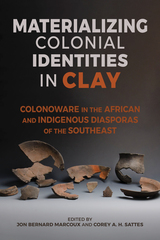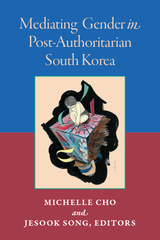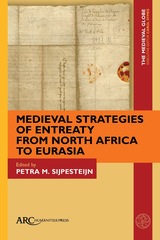183 scholarly books by Assoc of College & Research Libraries and 13
start with I
183 scholarly books by Assoc of College & Research Libraries and 13
183 scholarly books by Assoc of College & Research Libraries
13 start with I start with I
13 start with I start with I

Improving Library Services in Support of International Students and English as a Second Language Learners
Leila June Rod-Welch
Assoc of College & Research Libraries, 2019

Information Literacy Instruction Handbook
Christopher N. Cox
Assoc of College & Research Libraries, 2008

Informed Learning
Christine Bruce
Assoc of College & Research Libraries, 2011

Informed Learning
Christine Bruce
Assoc of College & Research Libraries, 2011
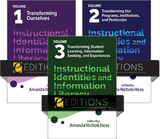
Instructional Identities and Information Literacy
Three Volume Set
Amanda Nichols Hess
Assoc of College & Research Libraries, 2023
Are librarians teachers? Many academic librarians enter teaching roles with limited experience or education in instruction, discovering how to engage students in learning from their own observations, trial-and-error, or professional learning opportunities.
Grappling with this potentially unexpected identity comes amid a time of significant transition for higher education itself. Academic librarians must figure out how to counter mis-, dis-, and malinformation, address shrinking funding for collections while costs increase, and establish meaningful partnerships in diverse, data-driven environments. And writ large, librarianship as a profession continues to grapple with its responsibility to challenge information illiteracy across contexts, its support of systemic systems of oppression under the guise of neutrality, and its value to a society flooded with information.
In three volumes, Instructional Identities and Information Literacy uses transformative learning theory—a way of understanding adult learning and ourselves—to explore the ways librarians can meaningfully advance how we think about our identities, instructional work, and learning as transformation. Three volumes explore:
Grappling with this potentially unexpected identity comes amid a time of significant transition for higher education itself. Academic librarians must figure out how to counter mis-, dis-, and malinformation, address shrinking funding for collections while costs increase, and establish meaningful partnerships in diverse, data-driven environments. And writ large, librarianship as a profession continues to grapple with its responsibility to challenge information illiteracy across contexts, its support of systemic systems of oppression under the guise of neutrality, and its value to a society flooded with information.
In three volumes, Instructional Identities and Information Literacy uses transformative learning theory—a way of understanding adult learning and ourselves—to explore the ways librarians can meaningfully advance how we think about our identities, instructional work, and learning as transformation. Three volumes explore:
- Transforming Ourselves
- Transforming Our Programs, Institutions, and Profession
- Transforming Student Learning, Information Seeking, and Experiences
[more]
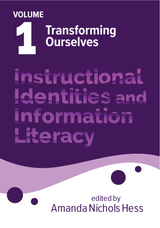
Instructional Identities and Information Literacy
Volume 1: Transforming Ourselves
Amanda Nichols Hess
Assoc of College & Research Libraries, 2023
Are librarians teachers? Many academic librarians enter teaching roles with limited experience or education in instruction, discovering how to engage students in learning from their own observations, trial-and-error, or professional learning opportunities.
Grappling with this potentially unexpected identity comes amid a time of significant transition for higher education itself. Academic librarians must figure out how to counter mis-, dis-, and malinformation, address shrinking funding for collections while costs increase, and establish meaningful partnerships in diverse, data-driven environments. And writ large, librarianship as a profession continues to grapple with its responsibility to challenge information illiteracy across contexts, its support of systemic systems of oppression under the guise of neutrality, and its value to a society flooded with information.
In three volumes, Instructional Identities and Information Literacy uses transformative learning theory—a way of understanding adult learning and ourselves—to explore the ways librarians can meaningfully advance how we think about our identities, instructional work, and learning as transformation. Three volumes explore:
Grappling with this potentially unexpected identity comes amid a time of significant transition for higher education itself. Academic librarians must figure out how to counter mis-, dis-, and malinformation, address shrinking funding for collections while costs increase, and establish meaningful partnerships in diverse, data-driven environments. And writ large, librarianship as a profession continues to grapple with its responsibility to challenge information illiteracy across contexts, its support of systemic systems of oppression under the guise of neutrality, and its value to a society flooded with information.
In three volumes, Instructional Identities and Information Literacy uses transformative learning theory—a way of understanding adult learning and ourselves—to explore the ways librarians can meaningfully advance how we think about our identities, instructional work, and learning as transformation. Three volumes explore:
- Transforming Ourselves
- Transforming Our Programs, Institutions, and Profession
- Transforming Student Learning, Information Seeking, and Experiences
[more]
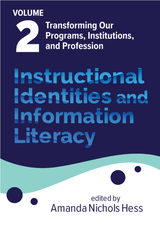
Instructional Identities and Information Literacy
Volume 2: Transforming Our Programs, Institutions, and Profession
Amanda Nichols Hess
Assoc of College & Research Libraries, 2023
Are librarians teachers? Many academic librarians enter teaching roles with limited experience or education in instruction, discovering how to engage students in learning from their own observations, trial-and-error, or professional learning opportunities.
Grappling with this potentially unexpected identity comes amid a time of significant transition for higher education itself. Academic librarians must figure out how to counter mis-, dis-, and malinformation, address shrinking funding for collections while costs increase, and establish meaningful partnerships in diverse, data-driven environments. And writ large, librarianship as a profession continues to grapple with its responsibility to challenge information illiteracy across contexts, its support of systemic systems of oppression under the guise of neutrality, and its value to a society flooded with information.
In three volumes, Instructional Identities and Information Literacy uses transformative learning theory—a way of understanding adult learning and ourselves—to explore the ways librarians can meaningfully advance how we think about our identities, instructional work, and learning as transformation. Three volumes explore:
Grappling with this potentially unexpected identity comes amid a time of significant transition for higher education itself. Academic librarians must figure out how to counter mis-, dis-, and malinformation, address shrinking funding for collections while costs increase, and establish meaningful partnerships in diverse, data-driven environments. And writ large, librarianship as a profession continues to grapple with its responsibility to challenge information illiteracy across contexts, its support of systemic systems of oppression under the guise of neutrality, and its value to a society flooded with information.
In three volumes, Instructional Identities and Information Literacy uses transformative learning theory—a way of understanding adult learning and ourselves—to explore the ways librarians can meaningfully advance how we think about our identities, instructional work, and learning as transformation. Three volumes explore:
- Transforming Ourselves
- Transforming Our Programs, Institutions, and Profession
- Transforming Student Learning, Information Seeking, and Experiences
[more]
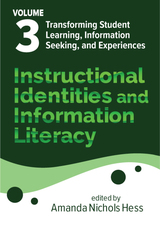
Instructional Identities and Information Literacy
Volume 3: Transforming Student Learning, Information Seeking, and Experiences
Amanda Nichols Hess
Assoc of College & Research Libraries, 2023
Are librarians teachers? Many academic librarians enter teaching roles with limited experience or education in instruction, discovering how to engage students in learning from their own observations, trial-and-error, or professional learning opportunities.
Grappling with this potentially unexpected identity comes amid a time of significant transition for higher education itself. Academic librarians must figure out how to counter mis-, dis-, and malinformation, address shrinking funding for collections while costs increase, and establish meaningful partnerships in diverse, data-driven environments. And writ large, librarianship as a profession continues to grapple with its responsibility to challenge information illiteracy across contexts, its support of systemic systems of oppression under the guise of neutrality, and its value to a society flooded with information.
In three volumes, Instructional Identities and Information Literacy uses transformative learning theory—a way of understanding adult learning and ourselves—to explore the ways librarians can meaningfully advance how we think about our identities, instructional work, and learning as transformation. Three volumes explore:
Grappling with this potentially unexpected identity comes amid a time of significant transition for higher education itself. Academic librarians must figure out how to counter mis-, dis-, and malinformation, address shrinking funding for collections while costs increase, and establish meaningful partnerships in diverse, data-driven environments. And writ large, librarianship as a profession continues to grapple with its responsibility to challenge information illiteracy across contexts, its support of systemic systems of oppression under the guise of neutrality, and its value to a society flooded with information.
In three volumes, Instructional Identities and Information Literacy uses transformative learning theory—a way of understanding adult learning and ourselves—to explore the ways librarians can meaningfully advance how we think about our identities, instructional work, and learning as transformation. Three volumes explore:
- Transforming Ourselves
- Transforming Our Programs, Institutions, and Profession
- Transforming Student Learning, Information Seeking, and Experiences
[more]
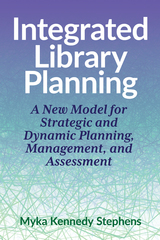
Integrated Library Planning
A New Model for Strategic and Dynamic Planning, Management, and Assessment
Myka Kennedy Stephens
Assoc of College & Research Libraries, 2023
Many library project plans, from small projects to institution-wide strategic planning committees, follow a linear trajectory: create the plan, do the plan, then review the outcome. While this can be effective, it also sometimes leads to disregarding new information that emerges while executing the plan, making the outcome less effective. Planning processes can also feel forced and predetermined if stakeholder feedback is not seriously considered. When this happens too many times, people stop offering their honest opinions and new ideas because they have learned that the planners do not really want to hear them.
In a concise seven chapters offering illustrations, charts, sample outlines, and many tools and resources, Integrated Library Planning offers a different kind of approach to planning that is both strategic and dynamic. It is fueled by open communication, honest assessment, and astute observation. Voices at the table, near the table, and far from the table are heard and considered. Its perpetual rhythm gives space to consider new information when it emerges and freedom to make changes at a time that makes sense instead of when it is most convenient or expected.
The era of fixed-length strategic plans is coming to an end. Five-year strategic plans had already given way to three-year strategic plans, and now we find ourselves needing to plan and function when nothing is certain beyond the present moment. The components of this model might look deceptively similar to the strategic planning practices used in libraries and organizations for decades; however, when implemented as a whole, with a monthly review cycle on a rolling planning horizon and space for regular analysis of information needs and behavior, it has the potential to shatter any previous notions of planning that serve only to satisfy administrators. Integrated Library Planning can help libraries effectively navigate and become agents of change.
In a concise seven chapters offering illustrations, charts, sample outlines, and many tools and resources, Integrated Library Planning offers a different kind of approach to planning that is both strategic and dynamic. It is fueled by open communication, honest assessment, and astute observation. Voices at the table, near the table, and far from the table are heard and considered. Its perpetual rhythm gives space to consider new information when it emerges and freedom to make changes at a time that makes sense instead of when it is most convenient or expected.
The era of fixed-length strategic plans is coming to an end. Five-year strategic plans had already given way to three-year strategic plans, and now we find ourselves needing to plan and function when nothing is certain beyond the present moment. The components of this model might look deceptively similar to the strategic planning practices used in libraries and organizations for decades; however, when implemented as a whole, with a monthly review cycle on a rolling planning horizon and space for regular analysis of information needs and behavior, it has the potential to shatter any previous notions of planning that serve only to satisfy administrators. Integrated Library Planning can help libraries effectively navigate and become agents of change.
[more]

Interdisciplinarity And Academic Libraries
ACRL 66
Craig Gibson
Assoc of College & Research Libraries, 2012

Interdisciplinary and Academic Libraries
Daniel C. Mack
Assoc of College & Research Libraries, 2012

International Students And Academic Libraries Initiatives
Pamela Jackson
Assoc of College & Research Libraries, 2011

International Students and Academic Libraries
Initiatives for Success
Pamela A. Jackson
Assoc of College & Research Libraries, 2011
READERS
Browse our collection.
PUBLISHERS
See BiblioVault's publisher services.
STUDENT SERVICES
Files for college accessibility offices.
UChicago Accessibility Resources
home | accessibility | search | about | contact us
BiblioVault ® 2001 - 2024
The University of Chicago Press


